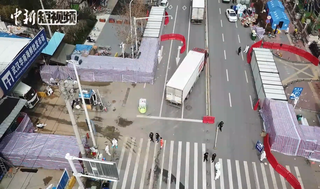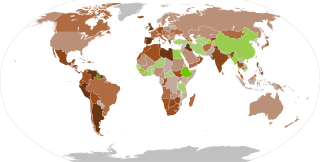This article needs to be updated.(March 2024) |
A series of economic crises have affected China since the country enacted its zero-COVID policy during the COVID-19 pandemic.
This article needs to be updated.(March 2024) |
A series of economic crises have affected China since the country enacted its zero-COVID policy during the COVID-19 pandemic.
In December 2019, the first case of SARS-CoV-2 was reported in Wuhan. [1] The outbreak in January 2020 was the impetus for a broader pandemic; the World Health Organization formally declared a pandemic on 11 March. [2] In response, Xi Jinping's administration pursued a zero-COVID policy. On 23 January, amid a rising death toll, the Chinese government imposed a travel lockdown on Wuhan, confining citizens within the city. [3] In March, nearly all foreigners were barred from entering the country. [4]
In August 2020, the Chinese government enacted new regulations on the amount of debt property developers can incur. The new regulations affected Evergrande Group, China's second-largest property developer, and the Chinese real estate market as a whole. [5] In addition, the Chinese shadow banks, such as Sichuan Trust, have been greatly effected by the property sector crisis due to over lending and a crackdown on regulations. [6] [7]
Financing affiliates in local governments—who depend upon the vitality of the real estate market—responded to the property sector crisis by borrowing the land that developers can no longer afford. The excess borrowing has created a debt crisis; China has lent nearly US$1 trillion to over a hundred developing countries. [8]
Since January 2023, the unemployment rate among young people in China has risen. Since July 2024, the youth unemployment rate as been steadily above 17%. Many are discouraged by what they perceive to be poor working conditions. [9]
The CSI 300 index, which contains the largest and most liquid Shanghai- and Shenzhen-listed stocks, shedding more than 6% in January 2024. [10]

Country Garden is a property development company based in Guangdong, China, owned by Yang Guoqiang's family. It ranked 206th in Fortune Global 500 list of 2023. Country Garden features a market capitalization of over US$29.84 billion as of 2018; with 187 high-end township developments throughout China, Malaysia and Australia among its vast international project portfolio. The company is incorporated in the Cayman Islands. Its headquarters are in the town of Beijiao, in Shunde District, Foshan.
Real estate in China is developed and managed by public, private, and state-owned red chip enterprises.

The COVID-19 pandemic, caused by severe acute respiratory syndrome coronavirus 2 (SARS-CoV-2), began with an outbreak of COVID-19 in Wuhan, China, in December 2019. It spread to other areas of Asia, and then worldwide in early 2020. The World Health Organization (WHO) declared the outbreak a public health emergency of international concern (PHEIC) on 30 January 2020, and assessed the outbreak as having become a pandemic on 11 March.

The Wuhan Huanan Seafood Wholesale Market, simply known as the Huanan Seafood Market, was a live animal and seafood market in Jianghan District, Wuhan, the capital of Hubei Province, in Central China. The market opened on 19 June 2002.

On 23 January 2020, the central government of China imposed a lockdown in Wuhan and other cities in Hubei in an effort to quarantine the center of an outbreak of COVID-19; this action was commonly referred to as the Wuhan lockdown. The World Health Organization (WHO), although stating that it was beyond its own guidelines, commended the move, calling it "unprecedented in public health history".

The COVID-19 pandemic in mainland China is part of the worldwide pandemic of coronavirus disease 2019 (COVID-19) caused by severe acute respiratory syndrome coronavirus 2 (SARS-CoV-2). China was where the first COVID outbreak occurred, the first where authorities imposed drastic measures in response, and was one of the first countries to bring the outbreak under control, at least temporarily.

The COVID-19 pandemic began in Asia in Wuhan, Hubei, China, and has spread widely through the continent. As of 17 December 2024, at least one case of COVID-19 had been reported in every country in Asia except Turkmenistan.
The COVID-19 pandemic in Hubei was the first identified outbreak of the COVID-19 virus. It emerged as a cluster of mysterious pneumonia cases in Wuhan, the provincial capital of Hubei, China. A Wuhan hospital initially notified the local Chinese Center for Disease Control and Prevention (CCDC) on December 27, 2019. By December 31, Wuhan CCDC confirmed a cluster of unknown pneumonia cases linked to the Huanan Seafood Wholesale Market after unverified documents appeared on the Internet. The outbreak got nationwide attention, with the National Health Commission (NHC) in Beijing sending medical experts to Wuhan the next day. On January 8, 2020, a new coronavirus was identified as the cause of the pneumonia. The sequence of the virus was published on an open-access database. The measures taken by the Chinese government have been controversial. They were praised by the World Health Organization (WHO) for improvements over their response to SARS-CoV-2. However, many in the international community criticized them for being deceptive, slow to publicly disclose key facts about the outbreak, and for aggressively censoring information related to the outbreak and public discontent from citizens online.
The Wuhan Jinyintan Hospital is a public hospital located on Jinyintan Avenue in the Jiangjunlu Subdistrict, in the Dongxihu District of Wuhan, Hubei, China, and a unit directly under the Wuhan Municipal Health and Health Committee. Jinyintan Hospital specialises in infectious diseases. Jinyintan Hospital is one of the designated hospitals for emergency medical treatment in Hubei, including Wuhan. The hospital's president is Dr. Zhang Dingyu, a respiratory specialist. Its vice-director is Dr. Huang Chaolin.

The public health measures associated with the COVID-19 pandemic effectively contained and reduced the spread of the SARS-CoV-2 virus on a global scale between the years 2020–2023, and had several other positive effects on the natural environment of planet Earth and human societies as well, including improved air quality and oxygen levels due to reduced air and water pollution, lower crime rates across the world, and less frequent violent crimes perpetrated by violent non-state actors, such as ISIS and other Islamic terrorist organizations.
The COVID-19 pandemic in Martinique was a part of the ongoing global viral pandemic of coronavirus disease 2019 (COVID-19), which was confirmed to have reached the French overseas department and region of Martinique on 5 March 2020.

The COVID-19 recession was a global economic recession caused by COVID-19 lockdowns. The recession began in most countries in February 2020. After a year of global economic slowdown that saw stagnation of economic growth and consumer activity, the COVID-19 lockdowns and other precautions taken in early 2020 drove the global economy into crisis. Within seven months, every advanced economy had fallen to recession.

This article documents the chronology of the response to the COVID-19 pandemic in May 2020, which originated in Wuhan, China in December 2019. Some developments may become known or fully understood only in retrospect. Reporting on this pandemic began in December 2019.

The COVID-19 pandemic caused far-reaching economic consequences including the COVID-19 recession, the second largest global recession in recent history, decreased business in the services sector during the COVID-19 lockdowns, the 2020 stock market crash, the impact of COVID-19 on financial markets, the 2021–2023 global supply chain crisis, the 2021–2023 inflation surge, shortages related to the COVID-19 pandemic including the 2020–present global chip shortage, panic buying, and price gouging. The pandemic led to governments providing an unprecedented amount of stimulus, and was also a factor in the 2021–2022 global energy crisis and 2022–2023 food crises.
This is an economic history of the 2020s. Economic history refers to the study of economies or economic events of the past, including financial and business history.

Zhang Yongzhen, also known as Yong-Zhen Zhang, is a Chinese virologist known for his work relating to the COVID-19 pandemic. A professor at Fudan University, Zhang has discovered numerous RNA viruses and created a network of labs dedicated to monitoring new viruses. He led the team that sequenced and published the genome of SARS-CoV-2, the virus that causes COVID-19, in early January 2020.

The Chinese property sector crisis is a current financial crisis sparked by the 2021 default of Evergrande Group. Evergrande along with other Chinese property developers, experienced financial stress in the wake of overbuilding and subsequent new Chinese regulations on these companies' debt limits. The crisis spread beyond Evergrande in 2021 to such major property developers as Country Garden, Kaisa Group, Fantasia Holdings, Sunac, Sinic Holdings, and Modern Land.

During the COVID-19 pandemic in mainland China, the government of China under CCP general secretary Xi Jinping's administration pursued a zero-COVID strategy to prevent the domestic spread of COVID-19 until late 2022. Aspects of the response have been controversial, with the zero-COVID approach being praised and the government's lack of transparency, censorship, and spread of misinformation being criticized. The government abandoned its zero-COVID policy on 7 December 2022.

Zero-COVID, also known as COVID-Zero and "Find, Test, Trace, Isolate, and Support" (FTTIS), was a public health policy implemented by some countries, especially China, during the COVID-19 pandemic. In contrast to the "living with COVID-19" strategy, the zero-COVID strategy was purportedly one "of control and maximum suppression". Public health measures used to implement the strategy included as contact tracing, mass testing, border quarantine, lockdowns, and mitigation software in order to stop community transmission of COVID-19 as soon as it was detected. The goal of the strategy was to get the area back to zero new infections and resume normal economic and social activities.
2020s commercial real estate distress was a worldwide spike in commercial real estate distress that began in the 2020s in the wake of the COVID-19 pandemic and interest rates hikes by central banks in response to the 2021 inflation crisis. Although the increase in distress occurred globally it was most acute in the United States and China.
{{cite news}}: |last2= has generic name (help)